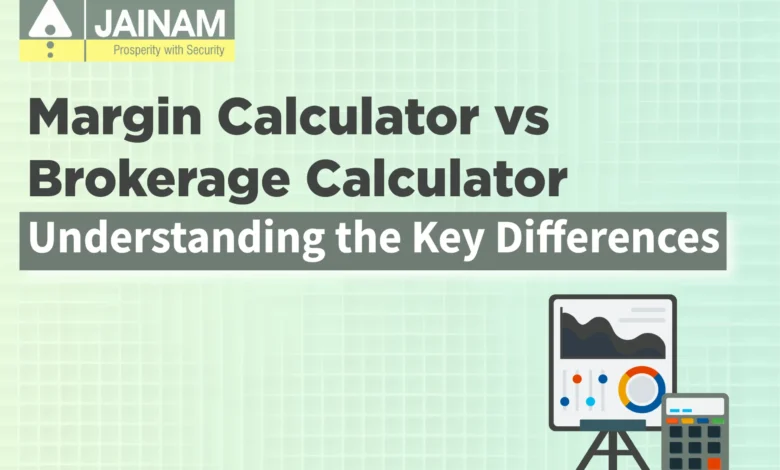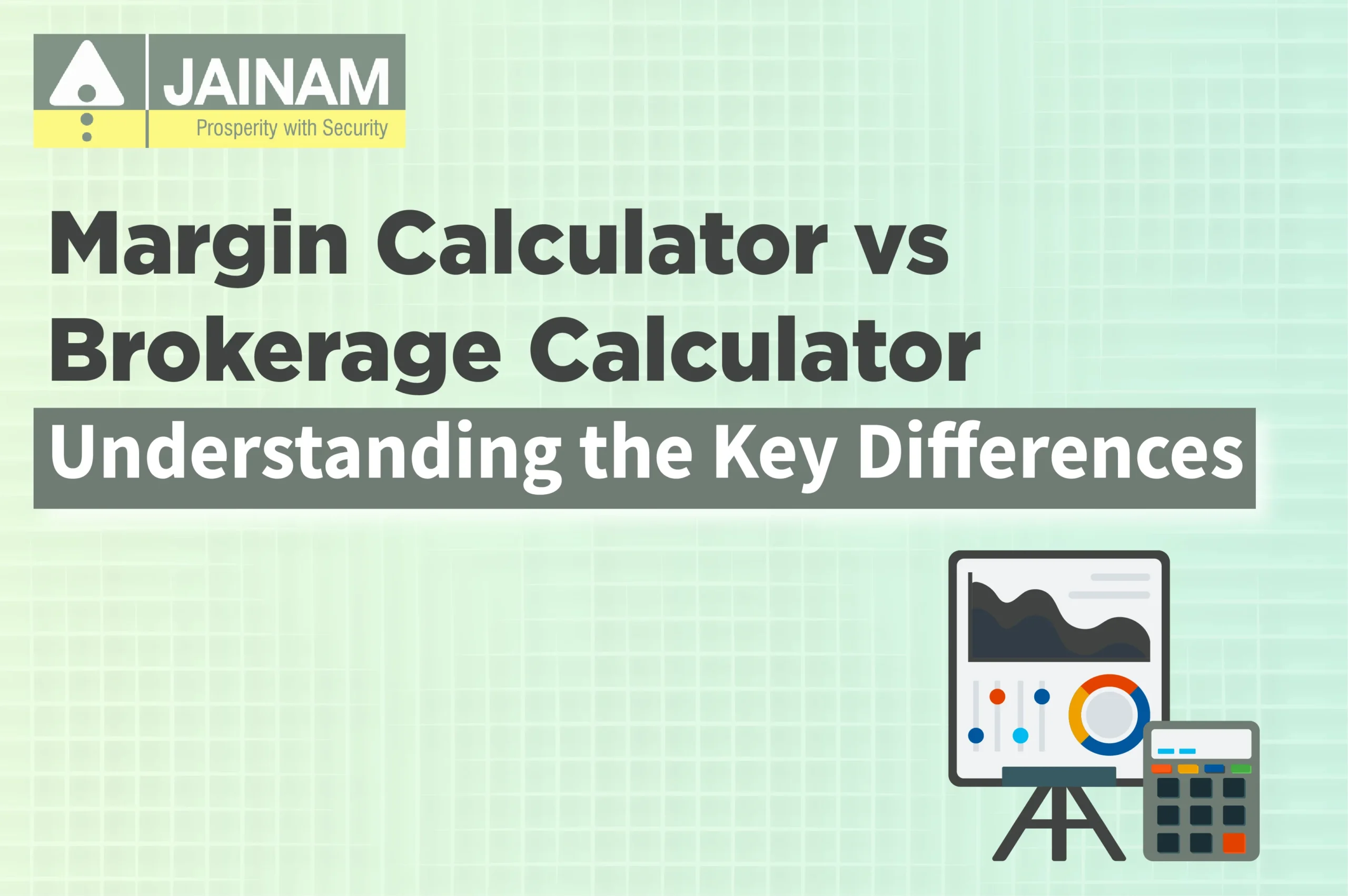
[ad_1]

Introduction
In the world of stock trading, understanding the costs and risks associated with each trade is essential. Whether you’re an experienced investor or just starting your brokerage trading journey, two tools stand out as invaluable: the Margin Calculator vs Brokerage Calculator. These tools help traders manage costs, optimise profits, and assess risk before entering a trade. But what’s the difference between them, and how can they benefit you?
Using a brokerage calculator online simplifies the calculation of brokerage fees and provides instant results, including a detailed breakdown of various charges, thus enhancing accuracy and reducing manual effort for users involved in trading.
In this blog, we’ll dive into the differences between a Margin Calculator vs Brokerage Calculator, explore their functions, and see how they help traders make informed decisions. We’ll also discuss how using these calculators can lead to better stock trading strategies and offer insights on choosing the right calculator for your needs.
Brokerage Calculators
A brokerage calculator is an indispensable online tool designed to help traders and investors calculate brokerage fees and other transaction charges associated with trades. By providing a clear view of costs, it aids in accurate profit or loss calculations, which is crucial for strategising trades across various segments, including equities, commodities, and derivatives. These calculators simplify the calculation process, significantly reducing the risk of manual errors. With a brokerage calculator, traders can make informed decisions, ensuring they are fully aware of the costs involved in their trading and investing activities.
Understanding Brokerage Charges and Contract Notes
Brokerage charges are fees levied by brokers for facilitating trades, typically calculated as a percentage of the total trade value. These charges can be substantial, especially for high-value trades, making it essential for traders to understand them thoroughly. Contract notes play a crucial role in this process by providing a detailed breakdown of all charges, including brokerage fees, statutory charges, and more. Understanding brokerage charges and contract notes is vital for making informed trading decisions. A brokerage calculator helps traders calculate and compare brokerage charges online, offering accurate information about the cost of each trade, thereby enhancing transparency and financial planning.
Benefits of Using a Brokerage Calculator
Using a brokerage calculator offers numerous benefits to traders. Firstly, it saves time on cost analysis, allowing for speedy and timely trading decisions. The calculator provides accurate information about the cost of each trade, making it easier for traders to make informed decisions. This is particularly beneficial for intraday traders who rely heavily on timing. Additionally, a brokerage calculator helps traders save money by identifying the minimum brokerage amount required. By using a brokerage calculator, traders can optimise their trading strategies, manage costs effectively, and ultimately enhance their profitability.
Calculating Brokerage for Different Investment Products
Brokerage calculators are versatile tools that can be used to calculate brokerage charges for various investment products, including equities, commodities, and derivatives. For equities, the calculator considers factors such as the buy and sell prices, quantity of shares, and brokerage percentage. When it comes to commodities, the calculator takes into account the contract value, brokerage percentage, and other associated charges. For derivatives, the calculator considers the premium, brokerage percentage, and additional charges. By using a brokerage calculator, traders can accurately calculate brokerage charges for different investment products, enabling them to make well-informed decisions in their trading and investing activities.
What is a Brokerage Calculator?
A Brokerage Calculator is an online tool that helps investors determine the fees or brokerage charges associated with a trade. An online brokerage calculator is particularly useful as it calculates costs associated with trades, including brokerage fees, transaction charges, and other expenses, enabling users to make informed decisions about their trades. It’s essential for traders because it provides a clear idea of how much they’ll pay in brokerage fees before executing a trade. These brokerage fees can vary depending on the broker, the type of trade, and the platform used.
The brokerage fee comparison can help you decide whether a particular brokerage platform or stockbroker is cost-effective for your brokerage trading style. By comparing brokerage charges from different platforms, you can choose one that offers the lowest brokerage charges while meeting your trading requirements.
How is Brokerage Calculated?
The brokerage charges can be calculated based on several factors, including:
- Flat-rate brokerage: A fixed fee for each trade, regardless of the size of the transaction.
- Percentage-based brokerage: A percentage of the total transaction value. The higher the value of your trade, the higher your brokerage fees.
- Exchange transaction charges: These are part of the various statutory charges that affect the overall cost of a brokerage trade. They fluctuate based on market segment and transaction type, impacting the total expenses incurred during trading activities.
Brokerage calculators simplify this process by calculating these charges based on the trade size and brokerage model, allowing you to understand the costs involved.
The Importance of Comparing Brokerage Fees
When you’re trading stocks, the brokerage fee can make a significant difference in your overall profitability. Choosing a platform with the lowest brokerage fee can save you a substantial amount of money, especially if you trade frequently or in large volumes. Additionally, the Securities Transaction Tax (STT) is an essential component of trading costs that should be considered when comparing brokerage fees. The brokerage comparison process should not only focus on the fees but also take into account the quality of services, ease of use, and additional features offered by the platform.
Factors Affecting Brokerage Charges
- Brokerage Model: Fixed versus percentage-based charges can drastically change the total cost of your trades. Some brokers may offer low fees for high-value trades, while others might offer flat rates that could be more economical for small trades.
- Platform Type: Whether you’re using an online broker, a traditional full-service broker, or a discount broker can also impact the brokerage charges you incur. Discount brokers tend to offer lower fees than full-service brokers.
- Type of Trade: Some platforms charge more for options, futures, or margin trades. Each of these may have different brokerage charges.
- Trading Volume: Many platforms offer discounts based on trading volume. The more you trade, the lower the cost per trade can become.
- Net P&L: Understanding the Net P&L amount is crucial as it summarises the total financial outcome of trading activities after accounting for all expenses, including brokerage fees. Using an online brokerage calculator can help determine these charges for intraday equity trading.
What is a Margin Calculator?
A Margin Calculator is a tool used to calculate the margin requirement for a trade. When you trade on margin, you borrow money from your broker to buy stocks or other securities. The margin requirement is the percentage of the total trade value that you must fund with your own money, while the broker covers the rest.
Using a Margin Calculator helps you calculate the amount of money you need to deposit to place a trade using margin. It’s especially important when you are trading with leverage, as it helps you understand your potential risk.
Understanding the Margin Formula
The margin formula is quite simple:
Margin Requirement = Total Trade ValueLeverage Factor
For example, if you want to buy 100 shares of a stock priced at ₹50 per share (total trade value = ₹5,000) and your broker offers 5:1 leverage, your margin requirement would be:
Margin Requirement=5000/5=1000
Thus, you would need to deposit ₹1,000 in margin to control ₹.5,000 worth of stock. The Margin Calculator helps you determine exactly how much you need to deposit based on your broker’s leverage.
How Margin Calculators Help Traders

- Risk Management: The Margin Calculator helps traders understand how much leverage they’re using and what the potential risks are. The more margin you use, the more risk you take on.
- Trade Planning: By knowing the exact margin requirement, traders can plan their trades better and avoid unnecessary surprises when it comes to capital requirements.
- Cost of Borrowing: While margin allows you to control a larger position than you could with your capital alone, it also means you’re borrowing money. If your broker charges interest on margin loans, using the Margin Calculator vs Brokerage Calculator will help you estimate the cost of borrowing and factor it into your profitability analysis.
Margin Calculator vs Brokerage Calculator: Key Differences
While both calculators are crucial for a successful trading strategy, they serve different purposes.

Purpose:
- A Brokerage Calculator is designed to help you estimate the fees associated with your trades, helping you choose cost-effective trading options.
- A Margin Calculator, on the other hand, helps you determine the amount of money required to make a margin trade, factoring in the leverage provided by your broker.
Risk Assessment:
- The Brokerage Calculator focuses more on the cost side of trading.
- The Margin Calculator is more focused on the risk side, ensuring you understand how much leverage you’re using and what your margin call requirements are.
Application:
- Use a Brokerage Calculator to decide which platform offers the best fees for your trading style.
- Use a Margin Calculator to ensure that you’re aware of the capital needed to make margin trades and the risks associated with those trades.
- An Investment Calculator helps you estimate how your investments will grow based on specific inputs like initial investment amounts, expected rates of return, and compounding frequencies.
Online Margin Calculator vs Brokerage Calculator NSE
With the rise of online trading platforms, most brokers now offer Online Margin Calculators that provide instant calculations. If you’re trading on the National Stock Exchange (NSE), you can find specific margin calculators designed for the exchange. These tools are incredibly helpful for traders looking to understand the margin requirements specific to the NSE.
The Margin Calculator NSE takes into account various factors such as the type of stock brokerage, the amount of leverage provided by your broker, and the current market conditions, ensuring accurate margin calculations.
How to Use a Margin Calculator for Smarter Trading
- Estimate Margin Requirements: Before entering a trade, use the Margin Calculator to estimate the funds required to maintain your position. This allows you to avoid undercapitalising and helps you avoid unexpected margin calls.
- Plan Your Leverage: The Margin Calculator helps you assess the level of leverage you’re comfortable with. It also helps you avoid taking on too much risk by ensuring you don’t over-leverage your trades.
- Optimise Capital Use: By understanding how much margin you need, you can use your available capital more efficiently, deploying it only when you have enough margin to handle the trade.
- Be Prepared for Market Volatility: A Margin Calculator also helps you determine how much your trade can lose before you are required to add more funds to maintain the position, which is crucial when trading volatile stocks.
Conclusion
Both the Brokerage comparison Calculator and the Margin Calculator are indispensable tools for modern-day traders. The Brokerage Calculator allows you to manage your costs, while the Margin Calculator ensures you’re aware of the risks involved in margin trading. By using these tools in tandem, traders can create better strategies, reduce unnecessary costs, and optimise their portfolio.
Understanding your investment portfolio is crucial for financial planning and investment growth. Using calculators can help you estimate growth based on your specific investment amounts and timelines, allowing you to make informed decisions.
So, whether you’re comparing brokerage charges to find the lowest brokerage fees or using a Margin Calculator to plan your leveraged trades, these calculators can help you make smarter, more informed decisions in your trading journey.
[ad_2]
publish_date]








